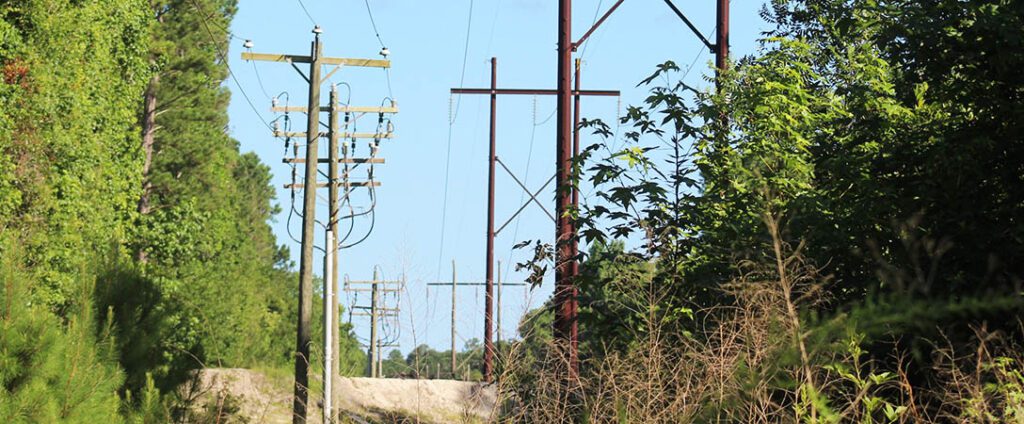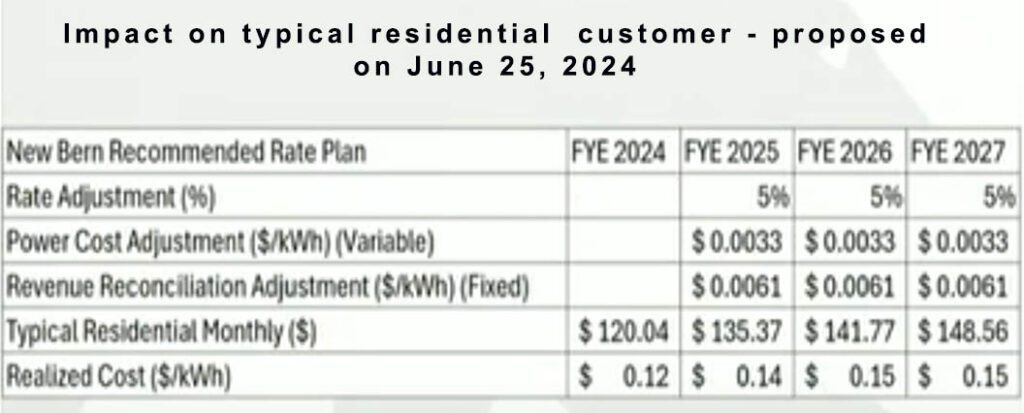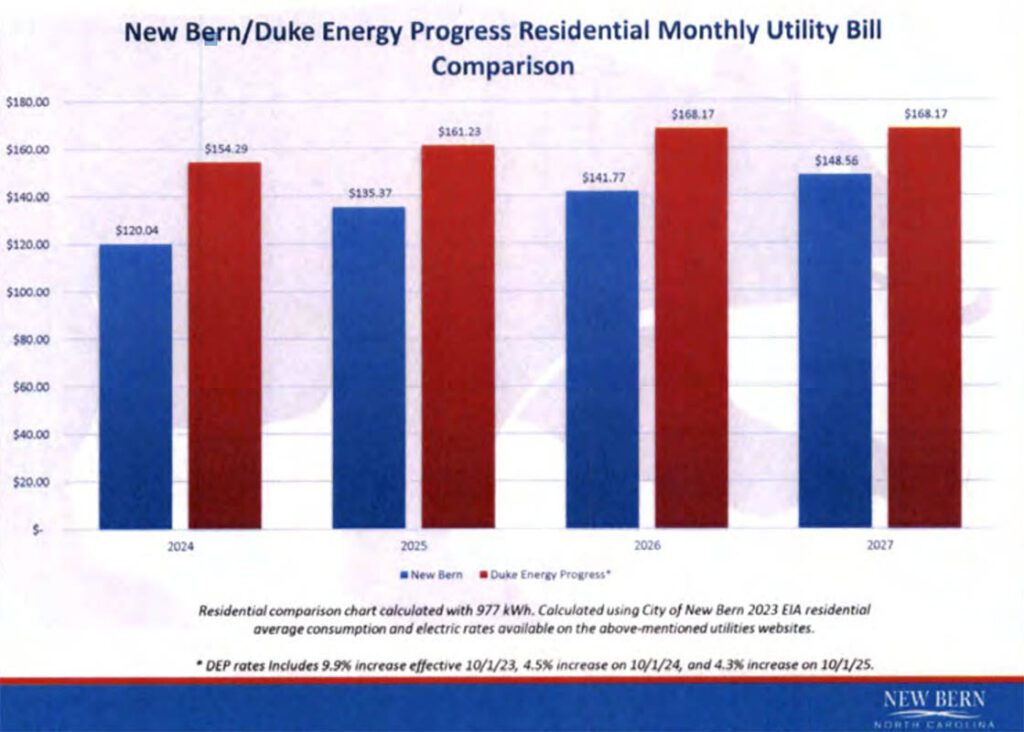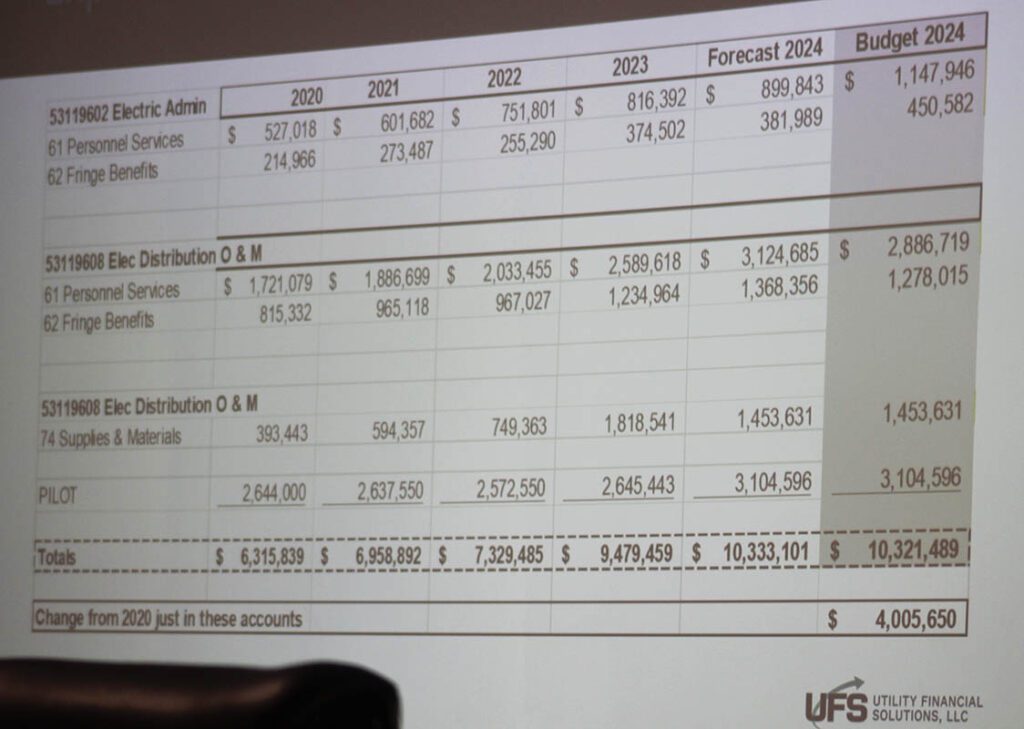
Editor’s Note: This article originally reported the electric rates on the city’s website did not reflect the 6% rate increase. The website has been updated with new rates since then.
Mayor Jeffrey Odham says he wants New Bern’s public power utility to mirror Duke Energy rates. The utility’s director said he doesn’t recommend it.
The majority of the New Bern Board of Aldermen rejected a proposed 5% rate increase for three years and a $0.0033 power cost adjustment (PCA) rider during the June 25, 2024 meeting at City Hall.
The board approved a 6% rate increase after the mayor said he wanted to match Duke Energy Progress’ rates.
Charles “Charlie” Bauschard, the director of New Bern’s Public Utilities told the board on June 25 that the utility continues to operate at a loss.
He has voiced concerns with the utility’s ability to respond to severe weather events due to an aging electric infrastructure.
In 2020 he estimated the cost of a new substation at $10 million, it’s now $22 million.
Bauschard told the board in December that they needed to prepare for a $3 million power supply adjustment rider after North Carolina Eastern Municipal Power Agency (NCEMPA) paid $53 million to Duke Energy for fuel adjustment charges.
New Bern is one of 32 members of NCEMPA. Electricities provides staff to manage contracts for NCEMPA.
Bauschard said the annual fuel adjustment charge is for the cost of power that wasn’t recovered by NCEMPA’s rates in 2022, such as ash handling costs, fuel charges and shipping costs.
Bauschard said the board should expect an additional $3 million rider in October 2024 for power supply costs in 2023.
He said the utility is also paying $3.4 million annually, which is approximately $285,000 a month for rider #8. He expected the debt to be paid off in July 2025.
NCEMPA sold their ownership interest in power plants, spare parts and fuel inventories to Duke for approximately $1.25 billion in July 2015, according to a U.S. Securities and Exchange Commission document. The purchase price exceeded the carrying value of the assets by $350 million. That rider was established to recover the costs.
The board lowered electric rates in 2015, 2016 and 2017.
Aster said, “The only option we have is to raise rates.”
“Yes, that’s the most obvious and probably the healthiest approach,” Bauschard said.
He said he was first going to petition the NCEMPA rate committee when they meet in January 2024 and ask them to suspend rider #1 and absorb the cost.
Alderman Bob Brinson ran the meeting as mayor pro tem.
He said, “So we will probably end up with a 3% rate increase on April 1.”
“Then we still have to figure out how to end up paying for rider #1 “true up” for 2022 and then the rider “true up” for 2023, which hadn’t been determined yet,” Brinson said.
Foster Hughes, the city manager, said Bauschard would come back to the board in January or February with recommendations for the board.
He said the board needs to think about potentially paying up to $6 million in power supply costs.
Mayor Odham showed up at the end of the 40-minute presentation.
Charlie Bauschard came back to the board on May 22.
Consultants with Utility Financial Solutions (UFC), LLC joined him and presented findings of an electric utility financial study and presented a rate plan that included a 5% rate increase for three years with a PCA during a work session at Pleasant Hill Community Center in New Bern, NC. NewBernNow.com reported on it here.

Dawn Lund, vice president of UFC, said the city’s last two audits showed the utility was “operating at a loss and the cash is declining, power supply costs are increasing and the infrastructure is aging.”
Odham asked, “In your position, would you adopt the philosophy where New Bern mirrors Duke’s rates.”
Bauschard said, “I think that would be shortsighted.”
“We have to be careful how we use benchmarks…If you ask me the same question should we have the same rates as Washington and Greenville? We have different financial plans. We have different financial obligations. We have different industries. Some have built capital, some have built fund balances over the last five years, ten years. Some have not. Some are absorbing these costs,” he said.
“I think it’s important that we look at ourselves and that’s the beauty of public power is that it’s our decisions. We can reflect on ourselves what we need for the utility. What we think our customers need,” Bauschard said.
He said as the utility director he wanted, “to build cash as soon as possible and I want to have enough money to do all the capital Improvements that we can and pay up the staff.”
He added, “I could get 17 cents a kilowatt, but is it right for the community? It’s not what we’re recommending.”
At the end of a lengthy presentation and discussion, Alderman Bobby Aster, Johnnie Ray Kinsey, Barbara Best, Hazel Royal and Rick Prill voted in support of a 5% rate increase for FY 2025, 2026 and 2027 which would be effective on July 1, 2024. They also supported a power cost adjustment.
Alderman Bob Brinson said he abstained, and Mayor Odham said, “I’d like more time to digest this.”
Charlie Bauschard presented a revised rate plan during the BOA’s June 25 meeting.
“We’re here to make business choices and business decisions,” Bauschard said.
He proposed a 5% rate increase for three years, a power cost adjustment rider of $0.0033 per kilowatt hour and a fixed revenue reconciliation adjustment rider of $0.0061 per kilowatt hour.
“The PCA would cover the current power cost in excess of the base rate,” he said.
“If the base rate is eight cents per kilowatt hour and the real power cost is eight and a half cents, the PCA would collect the other half a cent,” Bauschard said.
“The RRA would recover previous power supply costs that were not collected through our rates back to 2020,” he said.
Bauschard said the utility continues to operate at a loss and presented options that would increase revenue to cover expenses.
He said if they don’t take any action, they “would allow $3 million in current losses to grow to $6 million in 2025, our fund balance will be negative in 2025 and 2026, our debt coverage ratio becomes more negative and our lenders or the state may come in and set rates for us and none of us wants that,” Bauschard said.
He said if they don’t like the riders, the choice would be an 18% increase, noting it would be the best option to make the utility whole.
“If you want to choose the 5% rate path but pick and choose which riders you like without the PCA, you’re going to under collect your power supply expenses by $3 million a year and you’re going to drain fund balance into a negative,” he said.
“If you choose the 5% increase without the RRA, we’ll recover our power costs going forward, but we won’t restore fund balance and that’s what and we’re currently below our policy limits,” Bauschard said.
He compared an average customer’s monthly bill to an average Duke Progress Energy customer’s bill and said an average residential customer pays $120 a month and Duke’s customer pays $154.
He said next year it would be a $30 difference and it would be $40 less than Duke per month in 2027.

Alderman Prill said, “In the ideal world there would have been some rate increases approved back in 2020 that we would have been collecting 100% of what we needed to collect, but that unfortunately that did not happen.”
He said he was not comfortable with the reconciliation rider.
During the public hearing, Wayne Lytton said as “a senior citizen on a fixed income, it’s not really a good time.”
“This weekend we had power, people in front of our development with Duke Energy did not and it was very nice the service we received. When the power does go out that it’s restored in a timely manner,” he said.
Lytton said he didn’t understand going back four years and collecting money.
“Some type of action needs to be taken so that we can keep this entity profitable and serving the citizens of New Bern in the timely and efficient manner,” Lytton said.
Mike Duffy asked for a delay to allow for more time to market the load management program.
Bauschard agreed that they need to optimize the program but didn’t think a marketing campaign would resolve the issue.
Odham said he and Alderman Johnnie Ray Kinsey were members of the Board of Aldermen when rates were lowered. He said comments were made at that time that they needed to change the culture that was, “if you need more money in the general fund, you raise your electric rate and you take the money.”
Dawn Lund told the board during the May work session that transfers from the electric fund to the city’s general fund have increased by 17% as shown as payment in lieu of taxes (PILOT) in the below image.

Back to the June meeting, Odham said, “When we went through this process what was your request for rate increase last year, I don’t believe it came up.”
Bauschard responded, “I did not recommend one last year.”
“As far as the cost recovery just from my standpoint, that’s gone, it’s over with. That loss is gone. I appreciate you as a staff member wanting to recover it. That’s gone,” Odham said.
“The PCA, I have a lot of heartburn with that, because I talk to a lot of people and it’s just complicated,” he said.
“I would vote tonight to mirror Duke’s rates. It’s hard for anybody to say how are you charging me the same thing that Duke charges customers when we provide a better service,” Odham said.
Odham continued, “We also have in city sewer water rates and out of city sewer and water rates. Why we don’t have that for electric, I’m not quite sure, but I think it’s something that we should look at because this is a benefit of being on the City of New Bern and if it should, then our taxpayer should be the one that benefits from that. So I think I’m done for a little bit.”
Alderman Johnnie Ray Kinsey said, “I agree with the mayor that we should look at two services, in city and out of in city.”
“I feel that it’s very difficult to go back to try to charge someone for power that we dropped the ball on. I don’t know what happened there, but I hope that that doesn’t happen again,” he said.
Kinsey added, “I’ve been wanting to get a raise since I’ve been on the board and haven’t gotten one yet. Would you like to give that to me tonight, sir? I’m just teasing you.”
This year’s budget shows a 2% increase in the governing board’s salary.
Alderman Barbara Best said, “You are the one that has sleepless nights, you’ve come before this board on numerous occasions for several years. You’ve been talking about our failing agent system. We don’t have the capital to support our system. What do you recommend?”
Bauschard recommended the rate plan of 5% increase in FY 2025-27, the power cost adjustment and the revenue adjustment rider.
The board voted on a motion to adopt an ordinance to establish rates for consumption of electricity at 5%, effective July 1, 2024. Alderman Hazel Royal, Rick Prill and Barbara Best voted yes and a power cost adjustment rider. Alderman Johnnie Ray Kinsey, Bob Brinson, Bobby Aster and Mayor Odham voted no.
Odham asked if anyone had any recommendations for the rate.
Before anyone could respond, he said, “I’ve stated mine, which is to match Duke Energy’s rates.”
Aster asked, “If we match the Duke Energy rate, would that fill the void?
“It’s certainly a method. I need clarification, are we matching their rates and their riders,” Bauschard asked.
“If you look at kilowatt hours that doesn’t tell the whole story, because I have a $53 storm recovery fee, but when you factor all of those in and you break that down by kilowatt hours it puts you at 16 cent per kilowatt hours,” the mayor said.
He continued, “So if you get us to 16 cent per kilowatt hours, I would support that.”
Odham said it was very hard for him to explain to people why the city is cheaper than Duke “when they’re looking at two different bills and they’re looking at their neighbor across the street…that had power or you had power, you were on City of New Bern and you’re looking at your neighbor’s bill across the street. They didn’t have power this weekend because Duke was out for whatever reason, you really have to add all that information up,” he said.
“The messaging from the City of New Bern, for the realtors that used to have City of New Bern listed on the MLS that it was City of New Bern power so make sure you don’t sell this house because it’s going to hurt the homeowner. All of that’s gone now,” Odham said.
“Just on the residential side, if we raised to Duke’s rate in July, it would be a $40 increase to all of our residents on an average (per month) and then another $7 increase in 2027,” Bauschard said.
Aster said, “Would it be advisable to ask Charlie to go back to see if we raise this rate like this, would this fix this problem and then report back to us? I mean, do we have a clue whether or not this would even fix the problem?”
Foster Hughes said staff would have to evaluate it.
He said Electricities passed two riders onto the city that they’ve been paying for since May.
“We cannot afford to pay for those riders right now,” Hughes said.
Bauschard said it may take him a couple of months to look at all of the demand components and different rate classes in the bills.
Odham said, “I don’t think you have a couple months to figure that out. So the Board needs to make a decision on something and then you could work on that, but that’s the reason I brought this up during the work session. This was my suggestion, but I don’t think anybody else chimed in that they had any interest in that so it didn’t go anywhere so you didn’t have time or no reason to prepare any information.”
Prill made a motion to approve an ordinance for the power cost adjustment.
Alderman Best, Prill and Royal voted yes. Alderman Johnnie Ray Kinsey, Bob Brinson, Bobby Aster and Mayor Odham voted no.
“I would like to see what the figures are going to be and whether or not that if we match, or even a penny under, Duke’s kilowatt hours if that would resolve our issue. It would be nice if we could say we’re a penny cheaper per kilowatt hour than Duke. It might come in handy if we got a customer that’s got a choice,” Bobby Aster said.
The mayor asked what a 5% rate increase would be.
Bauschard estimated $2.6 million.
He said there would be another $3 million rider in October 2024.
Odham said, “I would be willing to do because obviously you can’t continue to operate in red, I would be okay with a 6% increase for this upcoming physical year.”
Kinsey asked if he could operate with that.
Mayor Jeffrey Odham said, “He can operate with nothing.”
Alderman Bob Brinson estimated a 6% rate increase would be $3.1 million.
The board voted to unanimously approve a motion to reconsider establishing rates of consumption at 6% for one year.
No action was taken on the revenue reconciliation adjustment rider.
The Board of Aldermen met again on July 9.
Alderman Best said she had received a lot of calls from people.
“They know about the rate increase, which was affected July 1, but they’re wanting to know what’s going to happen with the riders,” Best said.
“This board did adopt a 6% increase. No riders were included.” Huges said.
He said they would probably have a workshop in August or the first of September.
“Once we hear from Electricities, if we have another pass on from 2023, I believe from Duke Energy, so that could be a rider and we will discuss how we’re proposing to pass that rider along to the customer at that time,” Huges said.
NewBernNow.com reached out to Mayor Jeffrey Odham but have not received a response.
The electric rates are available on the City of New Bern’s website.
Meetings are live streamed on City 3 TV and on the city’s Facebook page. Recordings are normally uploaded to YouTube.
By Wendy Card, Editor. Send an email with questions or comments.
Watch the video of the June meeting here:

